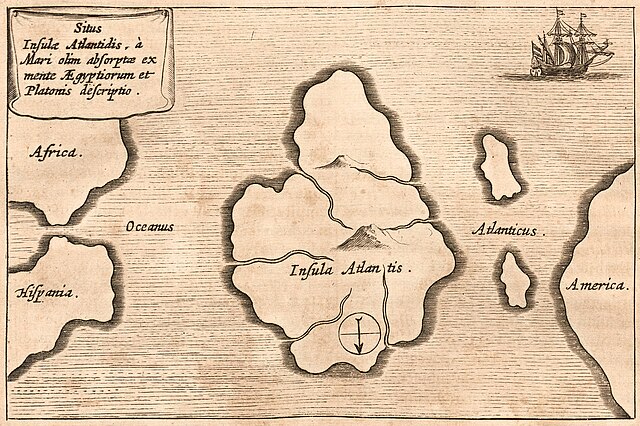
Is there any basis to the legend of Atlantis? No, there is no basis to the legend of Atlantis. It was invented by Plato to serve a purpose in his writings and was not based on anything. There was an event that could have been an inspiration for Atlantis, but there is no direct connection.
The legend of Atlantis was first introduced by Plato in 360 BC in two of his dialogues called Timaeus and Critias. Plato wrote 35 dialogues and 13 letters during his 75 or so years on this planet. That doesn’t sound like a lot, but he was living in a time where most people couldn’t read or write and books had to be copied by hand if they were to be distributed. It is a miracle that all of his writings have survived the two thousand and a bit years since he died. He mostly wrote in dialogue form because it was a good way of asking and answering probing philosophical questions. He could show a debate, rather than just write down his opinions. In all of his dialogues, he uses Socrates as the main person doing the speaking. Socrates was Plato’s teacher and obviously had a huge impact on him. The idea of teaching through dialogue rather than lecture was invented by Socrates, which is why we call it Socratic dialogue.
Plato introduces the idea of Atlantis in these two dialogues: Timaeus and Critias. In the dialogue, Socrates is thinking about the existence of a perfect society. He asks the other characters to tell him stories of a perfect society. Critias tells a story that he thinks might be historical, and this story is the origin of the Atlantis legend. All mentions of Atlantis in the world come after this point and there are none that predate it.
What does Plato say about Atlantis? When Critias tells the story of Atlantis, he says that the story comes from Solon, a Greek statesman, who visited Egypt two hundred years earlier (580 BC), where he heard the story of Atlantis. He said that it was an ancient city state that was just off the pillars of Hercules, which are the two promontories on either side of the Strait of Gibraltar, leading into the Mediterranean Sea. One is the Rock of Gibraltar, in Southern Spain, and the other is in North Africa. Plato says that Atlantis was an island that was larger than Libya and Asia together. In Plato’s time, Libya meant modern-day northern Africa and Asia probably meant Turkey, which was Asia Minor. That would make Atlantis enormous. Plato goes on to say that the island was roughly 555 km across, which isn’t quite as big, but it is still sizable. Because of this, Plato said that it was not possible to sail into the Atlantic as the sunken island made it too shallow. He said that the people who lived on the island were very powerful and had an empire that stretched through north Africa and up into southern Europe. Plato said that the island was sunk by an earthquake and became a muddy shoal in the Atlantic ocean.
Why isn’t Atlantis real? Plato is obviously using the story of Atlantis as a point in his dialogue. He is talking about the dangers of excessive pride, which ends up being the downfall of Atlantis. However, even if it wasn’t allegorical, were Atlantis to be real, there would be a lot more evidence. There would be historical records that existed before Plato talked about Atlantis. The Atlantic Ocean would actually be shallow and impassable, which it isn’t. An empire as large as that of Atlantis’s would have been written about, or would have left archaeological signs. Also, an earthquake wouldn’t be able to sink an island the size of Atlantis. Part of it would remain. If you think about how improbable the complete disappearance without any evidence of an island as large and influential as Atlantis would be, and you realize that Plato was merely trying to illustrate a point, then you have to see why Atlantis was never real.
There have been natural disasters that have devastated civilizations, and it is certainly possible that Plato was thinking about one of these when he wrote his dialogue, but there is no way to ever prove or disprove it. There was a volcano that destroyed the island of Thera in the 16th century BC. It is speculated that the eruption was so severe that it destroyed the Minoan civilization that was living on Crete. This could be inspiration for Plato’s account, but there is no way of knowing if he would have even known about the volcano and the Minoan culture. There are other natural disasters that have destroyed towns but, again, there is no way of knowing if Plato would have heard of them. I think it is safe to assume that Plato made up the story to illustrate a point, as he did so many other times in his dialogues. And this is what I learned today.
Try these’
Sources
https://www.bbc.co.uk/history/ancient/greeks/atlantis_01.shtml
https://en.wikipedia.org/wiki/Atlantis
https://en.wikipedia.org/wiki/Minoan_civilization
https://www.thecollector.com/atlantis-truth-behind-myth
https://www.tutorhunt.com/resource/26746
https://en.wikipedia.org/wiki/Plato
Image By Athanasius Kircher – Athanasius Kircher: Mundus subterraneus, vol. 1. Amsterdam 1664 – [1], Public Domain, https://commons.wikimedia.org/w/index.php?curid=48709668
